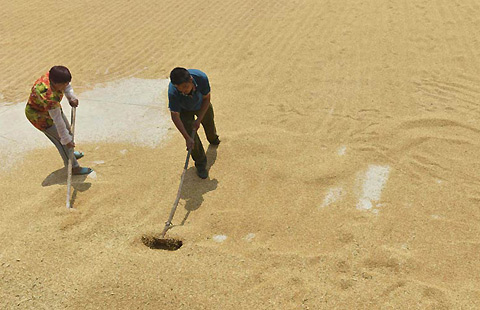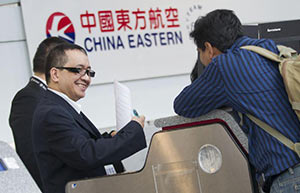China frets as middle class heads overseas
By Lyu Chang (China Daily) Updated: 2014-06-25 07:02Bayandor Farivar, co-founder and CEO of International Investment Alliance, who came to Beijing to promote an immigrant-investor program, known as EB-5, to Chinese investors, said several reasons, like air pollution, are prompting people to consider other countries.
"Most of my clients say that smog from pollution is a major concern," said Farivar, pointing to the grey skies outside the panoptic window. "Other factors like food safety, better education and employment prospects ... are also on the wish list."
For many others like Yi, it is more a case of taking the step for children, although she doesn't have a baby yet. But the couple are planning to have one in Canada later this year.
"People who plan to migrate to America and those going to European countries definitely have other priorities," said Chen Xi, an immigration lawyer at a US-based law firm.
"Eighty percent of the Chinese migrants to the US are pursuing such steps for their children and they themselves stay back in China to safeguard their source of wealth. But the others are just following the old adage of getting rich and then getting a foreign passport," Chen said.
Experts said that no matter whether it be clean air, food or wealth, China's middle-class people are concerned over aspects like whether their wealth would diminish due to policy changes or they would lose their social status.
Ren Zhiqiang, a real estate tycoon and an opinion leader, wrote in his microblog that "there are so many reasons for emigration, but the sense of insecurity is one of the important reasons why there is social instability. Only by giving citizens a sense of security can a stable society be achieved".
Chen said that the feeling of this insecurity is also reflected in the way Chinese invest.
"They are not that keen on non-real-estate projects, even though such investments would generate short-term benefits," she said. "Most of the Chinese investors feel that there are far too many uncertainties in such projects."
John Ross, a senior fellow at the Chongyang Institute for Financial Studies, at Renmin University of China, said that the exit of rich people will have little economic impact. It is the same in most countries, he said.
"China creates $4,000 billion a year in capital (compared to $2,000 billion in the US). Some people taking a few million dollars out of the country will therefore have no significant impact on China's economy," he said. "Nor will it significantly affect China's management which relies on hundreds of thousands of people who are genuinely middle class."
However, it still remains unknown whether such moves will have a long-term economic impact. With more talent heading out of the country, the government has embarked on several programs to keep its flock together. China launched the "Thousand Talent Program" in 2009 to bring back top academics, scientists and entrepreneurs.
"We got very good results out of the program, and we now have talent from all over the world working on a wide range of research technologies, innovation and other perspectives in their respective fields in China," said Xia Yamin, deputy director of Wuhan Eastlake High-tech Development Zone. "These top-level talents with different backgrounds ranging from hi-tech, bio-chemicals to hospitality are injecting new economic vitality into local businesses."
At the same time, China should also adopt a stricter and more rational tax system like the US to keep people from leaving, Ross said.
"At present China's tax system, unlike that of the US, actually condones people leaving the country - that is the tax system is 'unpatriotic' in character. China should therefore adopt a 'patriotic' tax system with the same rational principles as the US," he said.
|
 |
 |
| Chinese immigration spikes in New York City | Canadian Citizenship and Immigration minister visits SAFEA |
- China studying new Silk Road rail link to Pakistan
- Costs hit corporate profit growth in May
- EU investigates Chinese stainless steel products in dumping probe
- China Mobile faces 4G challenge
- GM banks on Transformers for faster growth
- Hohhot ends curbs on home purchases
- Alibaba chooses NYSE for IPO
- Unlisted firms get new scope in M&As

















